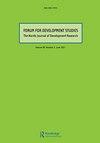Rights-Based Approach To Poverty Reduction: The Ghanaian Experience
IF 1.1
Q3 DEVELOPMENT STUDIES
引用次数: 1
Abstract
ABSTRACT The 1992 Constitution of the republic of Ghana obligates the state to guarantee that all citizens have access to social and economic livelihood. As a consequence, the government implemented the ongoing Livelihood Empowerment Against Poverty (LEAP) programme in 2008 to sustain development in these areas. Although Ghana has achieved progress in reducing extreme poverty and hunger, there is considerable evidence of poverty and widening inequality across the country. This study draws on the theoretical lens of the human rights-based approach (HRBA) to poverty reduction to examine how the implementation of the LEAP programme aligns with beneficiaries’ human rights entitlements. The findings suggest that the LEAP programme has led to some positive outcomes for beneficiaries, including enhanced self-esteem and happiness, household cohesion, social interaction and increased community involvement for beneficiaries. Nevertheless, the evidence suggests that the implementation of the LEAP programme only partially aligns with the HRBA to poverty reduction, which potentially undermines efforts to eradicate poverty and sustain development in Ghana.基于权利的减贫方法:加纳的经验
摘要1992年《加纳共和国宪法》规定,国家有义务保证所有公民都能获得社会和经济生活。因此,政府在2008年实施了正在进行的生计赋权扶贫计划,以维持这些领域的发展。尽管加纳在减少极端贫困和饥饿方面取得了进展,但有相当多的证据表明,该国各地的贫困和不平等现象正在扩大。本研究利用基于人权的减贫方法的理论视角,研究LEAP方案的实施如何与受益人的人权权利相一致。研究结果表明,LEAP计划为受益人带来了一些积极成果,包括增强自尊和幸福感、家庭凝聚力、社会互动以及增加受益人的社区参与。然而,有证据表明,LEAP计划的实施仅部分符合HRBA对减贫的要求,这可能会破坏加纳消除贫困和维持发展的努力。
本文章由计算机程序翻译,如有差异,请以英文原文为准。
求助全文
约1分钟内获得全文
求助全文
来源期刊

FORUM FOR DEVELOPMENT STUDIES
DEVELOPMENT STUDIES-
CiteScore
1.80
自引率
14.30%
发文量
24
期刊介绍:
Forum for Development Studies was established in 1974, and soon became the leading Norwegian journal for development research. While this position has been consolidated, Forum has gradually become an international journal, with its main constituency in the Nordic countries. The journal is owned by the Norwegian Institute of International Affairs (NUPI) and the Norwegian Association for Development Research. Forum aims to be a platform for development research broadly defined – including the social sciences, economics, history and law. All articles are double-blind peer-reviewed. In order to maintain the journal as a meeting place for different disciplines, we encourage authors to communicate across disciplinary boundaries. Contributions that limit the use of exclusive terminology and frame the questions explored in ways that are accessible to the whole range of the Journal''s readership will be given priority.
 求助内容:
求助内容: 应助结果提醒方式:
应助结果提醒方式:


